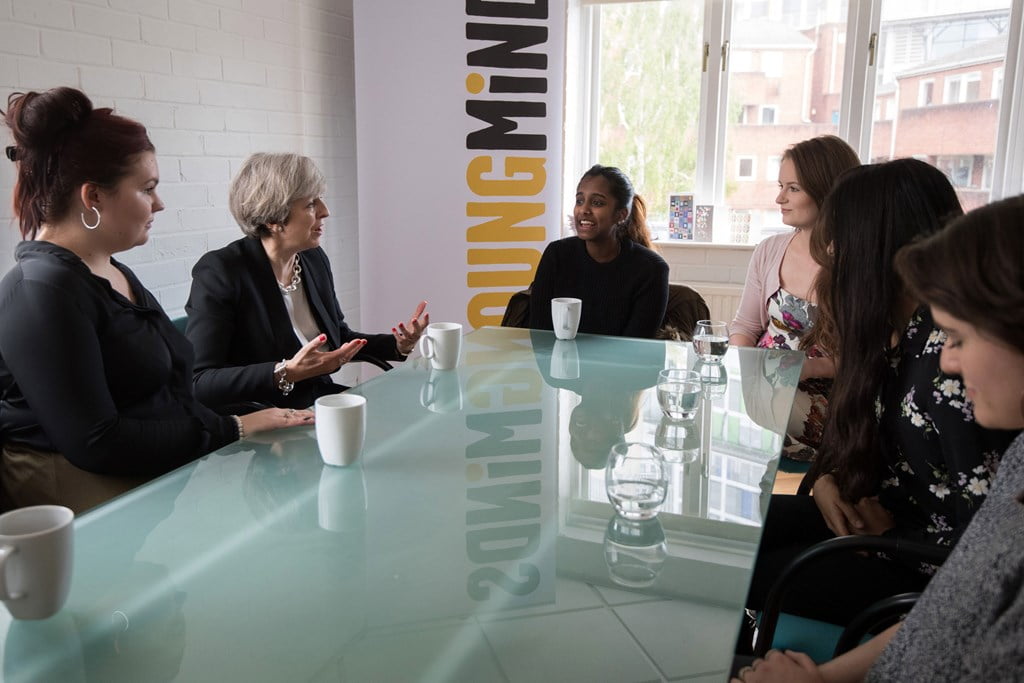
Strong-minded: the Prime Minister meets youth activists during a visit to the mental health charity Young Minds, in London, on Thursday
A SURVEY of the state of mental health in the UK suggests that two thirds of the population have experienced mental-health problems. The Prime Minister this week unveiled a pledge to tackle what she labelled the “burning injustices” of mental-health treatment.
Theresa May said that she would scrap the existing Mental Health Act if she won the General Election. She promised new policies to end discrimination against those with mental-health problems, and said that 10,000 more NHS staff would be trained in mental health.
The Conservatives say that their concern is based on the rise in the number of vulnerable people being subject to detention in police cells. They have also announced a pledge to train a teacher in every primary and secondary school in mental-health first aid, to help identify children who are suffering from anxiety and depression.
Critics, however, say that no new funding has been announced for the implementation of the plans.
The chief executive of the mental-health charity Sane, Marjorie Wallace, welcomed the pledge, but said: “There needs to be a guarantee that, alongside the measures proposed, resources are placed in front-line services.
“[Mrs May’s] ambitious and panoramic vision of mental health in the future is painting over some dangerous cracks and faultlines in psychiatric services, which many people are experiencing now. Cuts and closures mean there are few available in-patient beds in the country. For people in crisis, police are often the first resort.”
Data obtained through Freedom of Information requests last month showed that four regions of the UK were reducing spending on mental-health care by £4.5 million, despite NHS England’s saying that an extra £1 billion investment was needed in services by 2021.
A survey published this week by the Mental Health Foundation to coincide with Mental Health Awareness Week found that, of the 2300 people questioned, only 13 per cent of respondents felt that they had good mental health. Four in ten people said that they had suffered from depression; a quarter had experienced a panic attack; and the majority of people out of work — 85 per cent — had had a mental-health problem.
People in the lowest income bracket , earning less than £1200 a month, were more likely to have suffered mental ill-health than those in the highest income bracket, earning more than £3701 a month.
In total, two thirds of the respondents admitted to having had a mental-health problem, rising to seven in every ten women, young adults aged 18 to 34, and people living alone. Over-55s had the best mental health, the survey found.
The Mental Health Foundation said that the results showed that the collective mental health of the UK was “deteriorating”.
The Foundation has called on the Government to double mental-health-research funding in the next five years, from the existing 5.8 per cent of total UK health-research spending, and to set up a Royal Commission to look at how to prevent mental ill-health.
Dr Kate Middleton, the director of the Mind and Soul Foundation, which encourages the Church to engage more with mental-health issues, said: “In the midst of yet more very worrying statistics documenting the decline of mental health in the UK, we welcome indications that the Government are taking these seriously, and looking at plans to improve services.
“We urgently need to see change at ground level; so that vulnerable patients in need can access effective treatment. We know there is hope for those struggling with mental-health conditions, and, for many, recovery is possible, meaning they can be restored to fulfil the great potential within them.
“We wholly support recent calls for parity of esteem of mental and physical health, and hope that this is a first step towards seeing real change.”
[“Source-churchtimes”]







